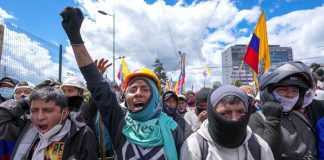THE LARGEST party of the European radical left, Rifondazione Comunista of Italy, held its national congress in July and made a decisive shift to the left.
This was a defeat for its long time national secretary, Fausto Bertinotti, and the man tipped to succeed him, the regional governor of Puglia Nichi Vendola.
At its previous congress three years ago, Rifondazione voted to join a coalition government of the centre left led by Romano Prodi. Prodi was elected with the narrowest of majorities in 2006.
But this year’s congress was held in the wake of April’s decisive electoral win for a right wing coalition led by Silvio Berlusconi. The radical left lost 2.5 million votes and, for the first time since the fall of fascism in 1945, there will be no communists in the Italian parliament.
The harsh reality of Berlusconi’s new government was brought home to all with the news that a state of emergency had been declared nationwide to remove illegal immigrants from the country.
Across Italy there is a sustained and officially approved campaign against immigrants and Roma gypsies, with all Roma inhabitants, citizens and non-citizens, adults and children, having to submit to finger-printing for a racial database.
Interpreting defeat
At the heart of the debate within Rifondazione there are two different explanations for the calamity that befell them and two different ways forward for the party.
Supporters of former government minister Paolo Ferrero pointed to disillusionment among left wing voters at the record of the Prodi government. This saw Italian troops committed to Afghanistan, the retirement age increased, a failure to repeal anti-immigrant laws implemented by the previous Berlusconi government, the go ahead for a massive US base in Vicenza and the refusal to convene a public inquiry into the policing of the 2001 G8 summit in Genoa.
Bertinotti and Vendola instead stressed a massive political and cultural shift within Italy which had seen a new right gain hegemony and which meant the historic eclipse of the left.
The supporters of Ferrero argued it was necessary to re-launch the party, taking it back onto the streets and re-engaging with the unions and social movements. In contrast the other side stressed the need to “regenerate” the left.
In the build up to the congress Bertinotti’s supporters had argued for a “constituent assembly of the left”, which was widely seen as centering on a merger with the left Democrats, members of the Democratic Party (Italy’s equivalent of Labor) who will not accept the dropping of any commitment to socialism.
Fererro and his supporters ruled out further collaboration with the centre left and pledged to work with the alternative left in Italy and elsewhere in Europe.
Both sides were prepared to admit that the decision to join the Prodi government had been a mistake. But the debate centred on the need to maintain the independence of Rifondazione and for it to contest next year’s European elections.
The effect of being in Prodi’s government was damaging for the party with attendances at many branch meetings falling away. More worrying was the shift among northern workers from voting for the left to voting for the anti-immigrant Northern League.
Some 45,000 party members had voted at party meetings in the build-up to congress. No sides’ document received an overall majority, though the Bertinotti-Vendola position got 47.3 percent and Ferrero’s 40.2 percent. The latter was able to win the congress by drafting a final resolution with supporters of three other documents. The congress voted by 342 votes to 304 for this.
Ferrero now takes over as party secretary. Supporters of the other camp pledged to stay in the party, but there is a worry of growing division at a dangerous time in Italy.
The media is talking of the possibility of a “hot autumn” as Berlusconi attempts to remove the national labour code which gives workers certain legal rights.
The Italian left and social movements have been consumed by internal debate since the electoral defeat while the right have led a racist onslaught of frightening proportions. At times the debates felt far removed from the horror of racist attacks taking place daily.
Hundreds of thousands of people still identify themselves as communists and millions have marched against war and neo-liberalism, and for union rights. The test for Rifondazione will be its ability to galvanise a response to Berlusconi and the Northern League.
By Chris Bambery, Socialist Worker UK





